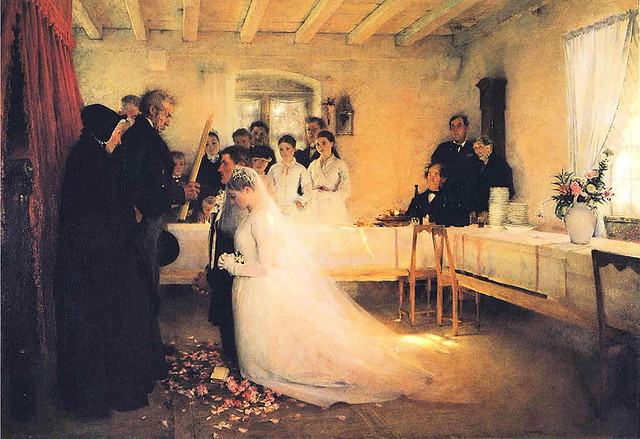Pascal Dagnan-Bouveret [Public domain], via Wikimedia Commons
After she read my last post about sexist Christian music, my friend, Sarah Morice Brubaker of Religion Dispatches, told me I'd gotten a terrible Christian song called "How Beautiful" into her head. I'd heard it many years ago, but what I didn't realize was that it makes frequent appearances at evangelical Christian weddings. It's a truly horrific song, but it got me thinking: This business about "husbands loving their wives as Christ loved the church" is more or less the foundation of Christian Right politics. Any guesses where we can learn all about it? That's right: Dippy Christian wedding songs!
And why not? "How Beautiful" is based directly on the fifth chapter of Ephesians, the alleged Pauline book in which wives are instructed to submit to their husbands "as unto the Lord" while husbands—designated "the head of the wife"—are exhorted to love their wives "just as Christ also loved the church" so "that he might sanctify and cleanse it."
On Friday, I argued that essentialist fundie views about women have a lot to do with the Christian Right's wankery around abortion rights and gender roles in general. Now I'm going to suggest that the fifth chapter of Ephesians is more or less the foundation of Christian Right politics.
Here's the third verse of the song: "How beautiful/The radiant bride/Who waits for her groom/With his light in her eyes/How beautiful/When humble hearts give/The fruit of your life/So that others may live/How beautiful/How beautiful/How beautiful/Is the body of Christ."
The important thing to understand about this is that fundamentalists understand it literally on both counts. It's about the relationship between husband and wife, and that between Jesus and his followers. The church waits until the end of the world, when Jesus is supposed to return and carry born-again Christians (aka "the church")—his bride—up to heaven. Like the church, the bride waits passively until a groom finds her and takes her for himself. She is given in marriage by her father to her husband.
When you know this, evangelical wedding songs—and Christian Right politics—make a lot more sense. When I was in college, young evangelicals who got married often used a song by one hipster-leaning Bebo Norman called "A Page is Turned." Then they'd make slideshows like this one by Youtube-uploading couple Joe and Tara:
Aww, aren't their childhood pictures cute? But, really, did you listen to the song's lyrics? They sound soft and sweet and everything, but they cover the same territory as the clunkier "How Beautiful."
First of all, the boy in the story has "a world to conquer at the age of ten." He's a man of action, the protagonist prepared by God to find his future wife as "the storybook is told." But the girl's story isn't nearly as interesting. She never gets "a world to conquer." Instead, we learn that she "has a heart that's bigger, as it is unfurled/By the language in her soul, that's teaching her to know/With a careful cover of love that will not fail."
Okay, so it's icky and sexist, but where exactly is the fundamentalism? It's not only implicit in the various roles designated to each gender, but in the actual lyrics. Let me explain: If you spend much time in fundamentalist circles, you might encounter the word "cover" as it appears in the last line of the above stanza.
Often, the word is used to justify various authorities thought to be god-ordained in a woman's life. The father has authority over a young, unmarried woman—he is, the fundie interpretation goes, her "covering," or protector. When she gets married, her husband becomes the "cover." And if the family is really hardcore (i.e., a member of the Quiverfull/Christian homeschooling movement), a woman might wear a headcovering—usually paired with ankle-length skirts—when she prays and/or when she goes out in public to symbolize submission to the authorities in her life.
It's kinda creepy, right? This transfer of ownership from father to spouse? This is where we get these Purity Balls in which the father pledges to "protect his daughter's heart" (and sexuality) until she gets married and becomes a "helpmeet" to her husband. It is in part the impetus for the Christian homeschooling movement, in which parents pledge to "shelter" their daughters at home until they get married. And it is definitely the reason for antiquated "courtship" and "betrothal" practices, in which the father take an active role in helping to select a daughter's husband—and all contact between the couple is supervised by the parents until the wedding.
This movement's beliefs about womanhood are often called Biblical Womanhood or True Womanhood. I once saw a magazine article claiming that women should never have won the vote because they should trust their husbands to make the right political decisions. I have a longtime friend who was not allowed to obtain her GED after she graduated from high school because she was never supposed to work outside the home. That is how regressive this movement can be.
So, is it really any wonder that such people feel that the public sphere belongs to them? That LGBTQ people do not make sense in this worldview and are cast as enemies? That they see abortion as a threat that women must be protected from? That "the world" represents demonic temptations just waiting to destroy these fragile daughters? That Quiverfull extremism follows from all of this?
Given the Republican party's association with such extremism, I am beginning to understand raising strong daughters as an explicitly feminist act. For every Quiverfull family I've met, I know countless more parents raising children who can think and discern for themselves. I think that gives us reason for hope.
*Thanks to kisekileia, Shannon Kearns, Emily Manuel and Sarah Morice Brubaker for ideas and fact-checking.
The comments section of this post has been changed to read-only.























